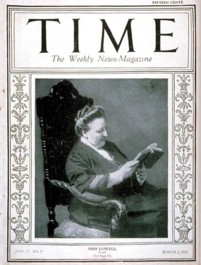|
Modern poetry is using a different idiom from that of its immediate predecessors, and on that account the world has found it, for the moment, hard of comprehension. If I were obliged to define the dominant characteristic of this idiom in a word, I should say that it was "suggestion": The invoking a place or a character rather than describing it. Descriptions there are, of course, but the descriptions are, so managed as to give an atmosphere rather than an "exact" account. It is here, that the insistence on the "exact" word has caused so much misunderstanding. The critics regard a thing as being thus and so, and no other way; to them the "exact" word means the word which exactly describes it as it is. To the poet, the thing is as it suggests itself, in relation the whole, and the "exact" word is the - one which best renders - this suggestion.
It is because of the dominance of suggestion that the modern poet makes no running comments in his proper person, throughout an objective poem The action of his story suggests the commentary which he expects his reader's mind to supply. To a poet constantly, working with: suggestiton, there is no obscurity in this. Following this plan, many short lyrics seem to the - layman to end - in a puff of smoke. To those familiar with the idiom, they end, not in a puff of smoke, but with a gesture, all the. more eloquent because merely implied.
In short poems, suggestion can be carried to the extreme, as there is no danger of the reader losing the thread; in longer poems definite statement has to be more frequently employed, so as to keep the current, of the poem constantly, before the reader. But even here, attentive students will find a very different attitude from that of the older poets. They told storles. We do not tell stories we throw pictures on a screen, but. we ourselves remain in the dark.
I would not be misconstrued into saying, that the older method is wroug and ours right. Only the very young, or the very ignorant, dare make dogmatic statements of that sort. But the business of a poet is to record what he sees with his own eyes in the manner natural to him; and while admiring the great figures. of the past, we may at least concede that their world, and in consequence their thought, was. different from ours. If, seeing our world and finding it good and interesting, we record it in our own way, we at least have their magnificent precedent for our audacity.
Another: characteristic of the modern idiom in poetry, and one closely allied to suggestion, is Vividness. To state a thing in no matter what beautiful terms is not enough; it must impose itself upon the mind's eye in an inescapable picture. The Tennysonian tradition was one of melliflous verse; the stress was laid upon that, and as time drew his imitators away from the master, more and more importance came to be put upon it. The imitators give, us no pictures like those in Ike Lady of Shallot they only give us an easy, flowing, melodic line. A revolt was inevitable. We, perforce, represent that revolt.
The third characteristic of The New Poetry, and partcularly of Imagism is what might be metaphorically described as faithfulness to the architectural line. Following Mr. F. S. Damon, I will call it Concentration. It means the discarding of all extraneous detail which tends to blur or diminish the vividness of the main theme. In architecture this has always been a cardinal principle - that all ornament should follow the structural line. But in poetry this has seldom been stated, and only sporadically practised.
We see, therefore, that there are three outstanding qualities which go to make the idiom which I have called modern. They are: Suggestion, Vividness, and Concentration. A fourth might be included: Externality. I do not call it "objectivity" advisedly. I do not mean that this poetry is objective rather than subjective. I mean that it concerns itself with man in his proper relation to the universe, rather than as the lord and master of it. It is this attitude which leads to so many poems on nature, on eftects of trees and sky and water, by themselves, with no hint of the "pathetic fallacy" to heighten interest.
|
Related:
Spectric School of Poetry
Poetry, or parody?
Machine translation, or Faulkner?
Great prose, or not?
|
